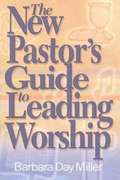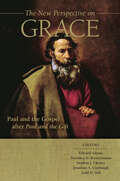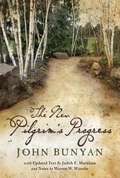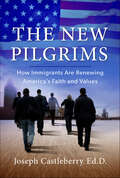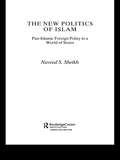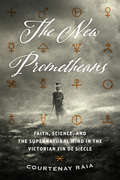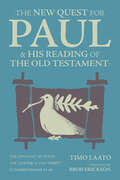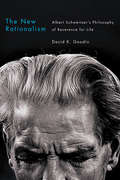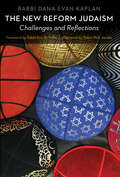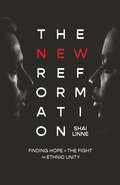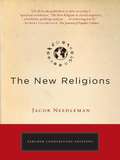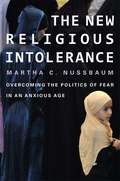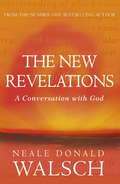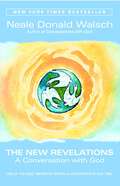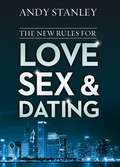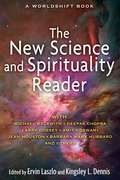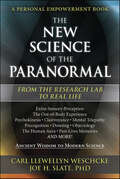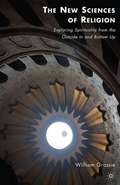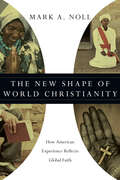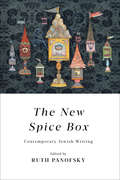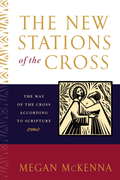- Table View
- List View
The New Pastor's Guide to Leading Worship
by Barbara Day MillerWorshipA down-to-earth guide to planning and implementing meaningful worship experiences for pastors, written especially for those new to the job.This practical book is for new pastors as they move into the role of worship leader and planner. When faced with the weekly rhythm of planning and leading worship, new pastors sometimes find themselves overwhelmed with the tasks. The book centers on the pastor and his/her identity as worship leader, on guidelines for leadership, and on the 'why' and 'how' of worship services. Contents include: The Pastor as Leader; Leading on Your First Sunday; Rituals: "The way we do it here"; Leading in the Worship Service; Leading Prayer; Leading Communion; Leading Baptism; Leading through the Christian Year; Leading with Musicians; Leading the People into Leadership.To read chapter oneclick here"I heartily commend this book to new pastors. Get it and read it before you show up at your first appointment. Barbara Day Miller will save you from many a heartache and embarrassment. Though tagged as a new pastor's guide, most pastors I know will benefit by reading the New Pastor's Guide, especially the latter chapters about leading with musicians and guiding members of the congregation into worship leadership."Reverend Daniel T. Benedict, Jr., Director of Worship Resources, General Board of Discipleship, United Methodist Church"In the past couple of years, I have worshipped in about a hundred congregations. After that experience, I can tell you, HERE IS THE BOOK WE NEED! Barbara Day Miller packs this little book with a lifetime of the creative worship leadership and the inspired preparation of pastors to lead worship. Combining practical help with a deep theological understanding of, and heartfelt love of Christian worship, she gives pastors everything they need to lead God's people in prayer and praise."William H. Willimon, Bishop, the North Alabama Conference of the United Methodist Church. Barbara Day Miller is the Assistant Dean of Worship at Candler School of Theology in Atlanta, Georgia.Church & Ministry/Church Life//Worship/Liturgy
The New Perspective on Grace: Paul and the Gospel after Paul and the Gift
by Edward Adams, Dorothea H. Bertschmann, Stephen J. Chester, Jonathan A. Linebaugh, and Todd D. Still, eds.For those inspired by Barclay&’s Paul and the Gift Over the course of his academic career, John M. G. Barclay has transformed how we think about Paul. Barclay&’s contributions to Pauline Studies reached a new height with the publication of his award-winning Paul and the Gift, in which he presents a sophisticated reading of Paul&’s theology of grace within the context of gift-giving in the Greco-Roman world. But where does Pauline scholarship go from here? Featuring a diverse group of internationally renowned scholars, The New Perspective on Grace collects essays inspired by Barclay&’s magnum opus. These essays broadly explore the implications of grace and gift across a variety of fields: biblical studies, theology, reception history, and theology in practice. Topics include: • Paul&’s soteriology • The role of grace in Paul&’s life and ministry • Implications of the New Perspective on Paul • Divine giving in the Gospels • Gift-giving and Christian aesthetics • Interpretations of Pauline grace from the patristic period to the present • Self-giving and self-care • Grace and ministry in marginalized communities The New Perspective on Grace is essential reading for all students and scholars who want to understand the current state of Pauline scholarship.Contributors: Edward Adams, Dorothea H. Bertschmann, Ben C. Blackwell, David Briones, Marion L. S. Carson, Stephen J. Chester, Susan Grove Eastman, Troels Engberg-Pedersen, Simon Gathercole, Beverly Roberts Gaventa, John K. Goodrich, Judith M. Gundry, Jane Heath, David G. Horrell, Jonathan A. Linebaugh, Joel Marcus, Orrey McFarland, Dean Pinter, Todd D. Still, Paul Trebilco, Michael Wolter
The New Pete (Jennifer #9)
by Jane SorensonJennifer returns from Haiti to find that her brother Pete has a radical new image. Justin tells her that Pete made a decision not to be a wimp anymore, and the rad appearance is part of his plan. Later, Pete confides to Jennifer that he wants to fit in at school and be popular. He begins to study a book, and to practice the popularity techniques in it on his family. After a short time with the in-crowd, Pete discovers that they are more cruel than cool and that he really doesn't enjoy "belonging." Then he finds a place where he really fits in, gets another new look, and a girl friend. It all adds up to The New Pete."
The New Pilgrim's Progress
by John Bunyan Judith E. MarkhamBunyan's allegory has been translated into more than 100 languages and enjoyed by millions of all ages and backgrounds. Now you can enjoy a revised edition that retains Bunyan's style and form, while translating archaic words, phrases, and expressions into modern English. When you read The New Pilgrim's Progress, you will discover that both this enduring classic and your Bible will read like new books to you.
The New Pilgrims: How Immigrants are Renewing America's Faith and Values
by Joseph CastleberryWe often assume America needs to help immigrants, but in The New Pilgrims, Joseph Castleberry opens our eyes to how the opposite is true, and how we can join in one of the greatest spiritual movements this country has ever seen.In the midst of an apparent religious decline in the United States, many Americans are looking for solutions to this dilemma. Our hope lies with Christian immigrants, who bring to our churches powerful testimonies of faith from cultures all over the world. As the "new pilgrims" settle into their lives here, they are taking the American church by storm and helping rebuild America's conservative foundations.It's time to acknowledge this exciting time of spiritual renewal and embrace the political and relational choices that will once again establish America as the "shining city on a hill" we all want it to be.
The New Politics of Islam: Pan-Islamic Foreign Policy in a World of States (Routledge Islamic Studies Series)
by Naveed S. SheikhThis is a timely study of the international relations of Islamic states, dealing both with the evolving theory of pan-Islamism from classical to post-caliphal times and the foreign-policy practice of contemporary states, especially Saudi Arabia, Iran and Pakistan, from the colonial period to the global aftermath of September 11. With a concise but analytic style, the book engages one-by-one with the questions of political theory, political geography and political sociology as they relate to international Islam. Its primary empirical investigation is centred on the Organization of the Islamic Conference (OIC), a powerful pan-Islamic regime, sometimes referred to as the 'Muslim United Nations'. In its theoretical deliberations on Islam and the postmodern condition, the book reconstructs contemporary understandings of how religious ideas and identities influence international politics in the Islamic world.
The New Prometheans: Faith, Science, and the Supernatural Mind in the Victorian Fin de Siècle
by Courtenay Raia PhDThe Society for Psychical Research was established in 1882 to further the scientific study of consciousness, but it arose in the surf of a larger cultural need. Victorians were on the hunt for self-understanding. Mesmerists, spiritualists, and other romantic seekers roamed sunken landscapes of entrancement, and when psychology was finally ready to confront these altered states, psychical research was adopted as an experimental vanguard. Far from a rejected science, it was a necessary heterodoxy, probing mysteries as diverse as telepathy, hypnosis, and even séance phenomena. Its investigators sought facts far afield of physical laws: evidence of a transcendent, irreducible mind. The New Prometheans traces the evolution of psychical research through the intertwining biographies of four men: chemist Sir William Crookes, depth psychologist Frederic Myers, ether physicist Sir Oliver Lodge, and anthropologist Andrew Lang. All past presidents of the society, these men brought psychical research beyond academic circles and into the public square, making it part of a shared, far-reaching examination of science and society. By layering their papers, textbooks, and lectures with more intimate texts like diaries, letters, and literary compositions, Courtenay Raia returns us to a critical juncture in the history of secularization, the last great gesture of reconciliation between science and sacred truths.
The New Quest for Paul & His Reading of the Old Testament: The contrast between the "Letter" & the "Spirit" in 2 Corinthians 3:1-18
by Timo LaatoThe author is known as a strong opponent of the so-called New Perspective on Paul. In this book, he seeks to move beyond that debate and open new vistas in Pauline research. There is a need for much revision. The author first dives in to a detailed exegetical study of 2 Corinthians 3, a chapter that has a reputation of being an exegetical nightmare. He examines the interpretational problems associated with the opposition between the letter that kills and the Spirit that gives life. Fresh insights emerge. Ultimately, the whole issue turns on the question whether to understand the Old Testament ac cord ing to the "literal-letteral" or "literal-spiritual" sense. As a consequence, Paul breaks up with Ju da ism and pulls down the works of the law since he competes against the view of observing the Torah "in flesh" and ac cording to the "literal-letteral" meaning of the text. He regards such a reli gious pur suit as the worst form of human self-righteousness and self-praise (despite the serious efforts to true piety). On the other hand, Christians have undergone a transformation in terms of re-creation, rege neration, resusci tation, resur rec tion, or revitalization. The Spirit gives them life. He reigns in them. Hence, Christians do fulfill the whole Mosaic law. Yet, they fulfill it "in Spirit" and not "in flesh," in other words, according to the "literal-spiritual" and not "literal-letteral" sense of Scripture. As a consequence, they do not bolster their self-righteousness and self-praise. To corroborate his the sis, the author draws on similar wordings in other Pauline letters and several passages in the Old Tes ta ment from Exodus, Jeremiah, and Ezekiel. The author concludes that the New Perspec tive on Paul has run its course. A New Quest for Paul is needed. Therefore, this book is needed.
The New Rationalism
by David K. GoodinAlbert Schweitzer (1875-1965) preached a message of reverence for life - all life - that touched the hearts of a generation. As a medical doctor in French Equatorial Africa who selflessly helped those in need, Schweitzer was recognized with the Nobel Peace Prize in the wake of two world wars. But less than fifty years since the time of his death, the great humanitarian and scholar has faded from public awareness. In The New Rationalism, David Goodin explores the underlying philosophy behind Schweitzer's ethic of compassion, presenting it as a response to contemporary questions in social justice, economic equality, and environmental action. For the first time, the political, sociological, and philosophical contexts supporting the development of Schweitzer's ethic are examined in order to bring his timeless message of elemental morality to new life for the modern world. Inspired by Arthur Schopenhauer and Friedrich Nietzsche, Schweitzer built his ethic to create an elemental nature philosophy compatible with empirical science, and to support a new ontological understanding of the human person - a project he termed the New Rationalism. Goodin recovers and analyzes Schweitzer's arguments and shows where his theories can provide a framework for both environmental and civic ethics today.
The New Rationalism: Albert Schweitzer's Philosophy of Reverence for Life
by David K. GoodinAlbert Schweitzer (1875-1965) preached a message of reverence for life - all life - that touched the hearts of a generation. As a medical doctor in French Equatorial Africa who selflessly helped those in need, Schweitzer was recognized with the Nobel Peace Prize in the wake of two world wars. But less than fifty years since the time of his death, the great humanitarian and scholar has faded from public awareness. In The New Rationalism, David Goodin explores the underlying philosophy behind Schweitzer's ethic of compassion, presenting it as a response to contemporary questions in social justice, economic equality, and environmental action. For the first time, the political, sociological, and philosophical contexts supporting the development of Schweitzer's ethic are examined in order to bring his timeless message of elemental morality to new life for the modern world. Inspired by Arthur Schopenhauer and Friedrich Nietzsche, Schweitzer built his ethic to create an elemental nature philosophy compatible with empirical science, and to support a new ontological understanding of the human person - a project he termed the New Rationalism. Goodin recovers and analyzes Schweitzer's arguments and shows where his theories can provide a framework for both environmental and civic ethics today.
The New Reform Judaism: Challenges and Reflections
by Rabbi Dana Evan KaplanThis is the book that American Jews and particularly American Reform Jews have been waiting for: a clear and informed call for further reform in the Reform movement.In light of profound demographic, social, and technological developments, it has become increasingly clear that the Reform movement will need to make major changes to meet the needs of a quickly evolving American Jewish population. Younger Americans in particular differ from previous generations in how they relate to organized religion, often preferring to network through virtual groups or gather in informal settings of their own choosing.Dana Evan Kaplan, an American Reform Jew and pulpit rabbi, argues that rather than focusing on the importance of loyalty to community, Reform Judaism must determine how to engage the individual in a search for existential meaning. It should move us toward a critical scholarly understanding of the Hebrew Bible, that we may emerge with the perspectives required by a postmodern world. Such a Reform Judaism can at once help us understand how the ancient world molded our most cherished religious traditions and guide us in addressing the increasingly complex social problems of our day.
The New Reformation: Finding Hope in the Fight for Ethnic Unity
by Shai LinneIn the sixteenth century, the church faced a doctrinal crisis. Today, the crisis is race.We all know that racial unity is important. But what&’s the right way to approach it? How can Christians of different ethnicities pursue unity in an environment that is so highly charged and full of landmines on all sides?In The New Reformation, Christian hip-hop artist Shai Linne shows how the gospel applies to the pursuit of ethnic unity. When it comes to ethnicity, Christians today have to fight against two tendencies: idolatry and apathy. Idolatry makes ethnicity ultimate, while apathy tends to ignore it altogether. But there is a third way, the way of the Bible. Shai explains how ethnicity—the biblical word for what we mean by &“race&”—exists for God&’s glory.Drawing from his experience as an artist-theologian, church planter, and pastor, Shai will help you chart a new way forward in addressing the critical question of what it means for people of all ethnicities to be the one people of God.
The New Reformation: Finding Hope in the Fight for Ethnic Unity
by Shai LinneIn the sixteenth century, the church faced a doctrinal crisis. Today, the crisis is race.We all know that racial unity is important. But what&’s the right way to approach it? How can Christians of different ethnicities pursue unity in an environment that is so highly charged and full of landmines on all sides?In The New Reformation, Christian hip-hop artist Shai Linne shows how the gospel applies to the pursuit of ethnic unity. When it comes to ethnicity, Christians today have to fight against two tendencies: idolatry and apathy. Idolatry makes ethnicity ultimate, while apathy tends to ignore it altogether. But there is a third way, the way of the Bible. Shai explains how ethnicity—the biblical word for what we mean by &“race&”—exists for God&’s glory.Drawing from his experience as an artist-theologian, church planter, and pastor, Shai will help you chart a new way forward in addressing the critical question of what it means for people of all ethnicities to be the one people of God.
The New Religions
by Jacob NeedlemanNow restored to print, here is philosopher Jacob Needleman?s groundbreaking study of America?s alternative spiritual movements, with a new introduction by the author. Originally published in 1970, The New Religions was the first full-scale study of alternative spirituality in America. It remains unparalleled for the intellectual depth and seriousness with which it regards Eastern, New Age, and alternative faiths on the American landscape. .
The New Religious Intolerance: Overcoming the Politics of Fear in an Anxious Age
by Martha C. NussbaumWhat impulse prompted some newspapers to attribute the murder of 77 Norwegians to Islamic extremists, until it became evident that a right-wing Norwegian terrorist was the perpetrator? Why did Switzerland, a country of four minarets, vote to ban those structures? How did a proposed Muslim cultural center in lower Manhattan ignite a fevered political debate across the United States? In The New Religious Intolerance, Martha C. Nussbaum surveys such developments and identifies the fear behind these reactions. Drawing inspiration from philosophy, history, and literature, she suggests a route past this limiting response and toward a more equitable, imaginative, and free society. Fear, Nussbaum writes, is “more narcissistic than other emotions. ” Legitimate anxieties become distorted and displaced, driving laws and policies biased against those different from us. Overcoming intolerance requires consistent application of universal principles of respect for conscience. Just as important, it requires greater understanding. Nussbaum challenges us to embrace freedom of religious observance for all, extending to others what we demand for ourselves. She encourages us to expand our capacity for empathetic imagination by cultivating our curiosity, seeking friendship across religious lines, and establishing a consistent ethic of decency and civility. With this greater understanding and respect, Nussbaum argues, we can rise above the politics of fear and toward a more open and inclusive future.
The New Revelations: A Conversation With God
by Neale Donald WalschNeale Donald Walsch's profound conversation with God continues with a "New Revelation" - brought to us at a time when we need it most. This life-changing book offers some possible, penetrating answers to the questions of our day, providing the tools to pull ourselves out of despair and towards a new world vision. Addressing the zeitgeist following the tide of events of September 11th, we are shown that the violence, loss, sorrow and terror of our world cannot be eliminated through political or economic action, but only by changing our beliefs. Five fallacies about life, combined with the five fallacies about God, continue to feed a deadly misconception that leads to devastating world events governed by violence and crisis. Through challenging the fallacies of our beliefs we can move forward, building at last a new world of peace and harmony based on our new, true beliefs about God and life.
The New Revelations: A Conversation with God
by Neale Donald WalschThe human race has reached a Time of Choosing. Our options are being placed before us by the tide of events -- and by those who are creating them. We can either move forward, building together at last a new world of peace and harmony based on new beliefs about God and Life, or move backward, separately and continuously reconstructing the old world of conflict and discord. The New Revelations provides us with the tools to move forward, to pull ourselves out of despair, lifting the whole human race to a new expression of its grandest vision. In this book, which offers possible and powerful answers to the questions facing the world, bestselling author Neale Donald Walsch urges us to open our hearts and minds to what may be one of the most important spiritual statements of our time. A conversation with God that began as a simple plea from one human being to the God of his understanding, The New Revelations is a life-altering book, given to us when we need it most.
The New Rules for Love, Sex, and Dating
by Andy Stanley“Are you the person the person you are looking for is looking for?" —Andy Stanley Single? Looking for the "right person"? Thinking that if you met the "right person" everything would turn out "right"? Think again. In The New Rules For Love, Sex & Dating, Andy Stanley explores the challenges, assumptions, and land mines associated with dating in the twenty-first century. Best of all, he offers the most practical and uncensored advice you will ever hear on this topic. Not for the faint of heart, The New Rules for Love, Sex & Dating challenges singles to step up and set a new standard for this generation. “If you don't want a marriage like the majority of marriages, then stop dating like the majority of daters!” —Andy Stanley Also includes a four-session small group discussion guide to be used with The New Rules for Love, Sex, and Dating video (sold separately).
The New Science and Spirituality Reader
by Ervin Laszlo Kingsley L. DennisBridging the gap between science and the world’s great spiritual traditions to move our worldview forward • With contributions from 28 leading scientists and spiritual thinkers, including Michael Beckwith, Deepak Chopra, Larry Dossey, Amit Goswami, Stanislav Grof, Jean Houston, Barbara Marx Hubbard, José Argüelles, and Peter Russell • Offers strategies to promote the fusion of science and spirituality • Explores phenomena at the crossroads of science and religion, such as the nonlocal mind, conscious evolution, and quantum consciousness Edited by Nobel Prize nominee Ervin Laszlo and WorldShift International cofounder Kingsley Dennis, this volume brings together 28 leading scientists and spiritual thinkers for a game-changing conversation on bridging the gap between science and religion. With contributions by Michael Beckwith, Deepak Chopra, Larry Dossey, Amit Goswami, Stanislav Grof, Jean Houston, Barbara Marx Hubbard, José Argüelles, Peter Russell, and many other prominent visionaries, this collection explores phenomena at the crossroads of science and religion, such as the nonlocal mind, conscious evolution, and quantum consciousness, and offers strategies to promote the fusion of science and spirituality and develop a multiperson planetary consciousness. This book reveals higher consciousness as the bridge between science and spirit, passionate curiosity as the common ground among scientists and seekers, and the urgent need for an alliance between science and the great traditions of spiritual wisdom to move our worldview forward and meet today’s global challenges.
The New Science of the Paranormal: From the Research Lab To Real Life
by Joe H. Slate Carl Llewellyn WeschckeUse Scientific Research for Empowerment, Growth, and SuccessSweep illusions away and use your mind for what it was intended: to lift human consciousness to a higher level and make this world a better place for you and future generations. The New Science of the Paranormal is a mind-expanding exploration of the scientific proof for paranormal phenomena and the ways you can use your paranormal potential to take control of your life.Discover a wealth of tools to create a life of greater success and happiness. Through expanding conscious awareness of your inner powers and abilities, you advance into the development of your Super-Conscious Mind where limitations drop away and realization of your most cherished dreams becomes reality.
The New Sciences of Religion
by William GrassiePerforming a critical analysis of new scientific research on religious and spiritual phenomena, Grassie takes a two-staged phenomenological approach working from the 'outside in' and the 'bottom up' without privileging at the outset any religious traditions or philosophical assumptions.
The New Shape of World Christianity: How American Experience Reflects Global Faith
by Mark A. NollChristianity Todayhowwhat
The New Spice Box: Contemporary Jewish Writing
by Ruth PanofskyThe New Spice Box includes short fiction, personal essays, and poetry by Jewish writers from a broad range of cultural backgrounds. Fresh and relevant, profound and lasting, this anthology features works by acclaimed short story writers David Bezmozgis, Mireille Silcoff, and Ayelet Tsabari; groundbreaking memoirists Bernice Eisenstein and Alison Pick; and award-winning poets Isa Milman, Jacob Scheier, and Adam Sol. The driving force behind The New Spice Box is the desire to uncover the twin touchstones of original expression and writerly craft, and to balance the representation of genres, styles, and authorial perspectives. Here, authors summon the past as they probe their cultural inheritance and move forward into the future. The New Spice Box shows that Jewish literary tradition, Jewish experience, and Jewish identity can be expressed in innumerable ways.
The New Stations of the Cross
by Megan MckennaOne of today’s most popular and respected Catholic writers presents the first guide to the new Stations of the Cross, reflecting the revisions made by Pope John Paul II. A traditional devotion for Catholics for more than four hundred years, the Stations of the Cross commemorates the route Jesus traveled from being sentenced to death, crucified, and then buried in a borrowed tomb on the outskirts of Jerusalem. In the past, the devotion included a number of stations based on popular stories of piety and devotion, but not mentioned in the Gospels. Over the past eight years, however, Pope John Paul II has made substantial changes to the devotion in his Good Friday celebrations of the stations, removing those not found in the Bible and replacing them with stations that more accurately follow scriptural accounts of Christ’s passion. The revised Stations of the Cross focuses on the condemned Jesus and on the community walking the way with him to the cross. Unrelieved by stories like Veronica’s wiping blood off the face of Jesus and his meeting with his mother; this is a story of an execution. The new stations deal directly with the pain, suffering, betrayal, and injustice to which Jesus was subjected. In explaining his reasons for revising the stations, the Pope has said that the alterations are intended to serve as a model for other devotions and to encourage the return to the Scriptures as the source of and inspiration for contemporary worship. In this helpful, authoritative guide, Megan McKenna presents the fourteen new stations with the scriptural passages that Pope John Paul II uses on Good Friday. She also provides a basic introduction to the practices and reflections on the importance of the devotion for present-day Catholics and Episcopalians.
